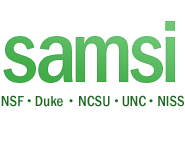For Post Docs
Postdoctoral fellowships (up to 6) are available for two SAMSI Research Programs in 2016-17:
1) Optimization, and
2) Statistical, Mathematical and Computational Methods for Astronomy.
Appointments will begin in August 2016 and typically last two years. Appointments are made jointly between SAMSI and one of its partner universities, where teaching is a possibility. Competitive salaries, travel stipends, and health insurance will be offered.
The Optimization Program aims to leverage the synergy between mathematics and statistics to produce ground breaking advances in three categories:
1) Optimization for large-scale statistical analysis,
2) Statistical approaches for the numerical solution of large-scale optimization problems, and
3) Applications of optimization.
Preliminary research foci include: optimization under uncertainty; convex and semidefinite optimization and extensions; robust and stochastic optimization, sparse regression; E/M and M/M algorithms; mixed integer, linear and nonlinear optimization; PDE-constrained optimization with uncertainties and optimal control. Application areas include: statistical inverse problems; computation of high-dimensional covariance functions; machine learning; image and signal processing, compressed sensing; energy; finance and computational decision analysis.
The Statistical, Mathematical and Computational Methods for Astronomy Program focuses on the vast range of computational, mathematical and statistical problems arising in modern astronomical and space sciences research, particularly due to the flood of data produced by both ground-based and space-based astronomical surveys at many wave-bands. A resurgence of interest in statistical and applied mathematical methods has emerged among astronomers and astrophysicists as they seek insights into the physical phenomena underlying such complex data. Coping with the current and future needs of astronomy missions requires concerted efforts by cross-disciplinary collaborations involving astronomers, computer scientists, mathematicians and statisticians. SAMSI is an ideal place from which to broadcast these issues and to involve the wider statistical and applied mathematical communities. The research areas that will form the main ingredients of the program include: astronomical simulations and big data issues, exoplanets, functional data analysis, gravitational wave astrophysics and lightcurve analysis in time domain astronomy.
Application to SAMSI
In your cover letter, please indicate your interest in one of the two programs (Optimization or Astronomy). Criteria for selection for SAMSI Postdoctoral Fellows include demonstrated research ability in statistical and/or applied mathematical sciences, interest and, to a lesser degree, experience in the SAMSI program areas, together with strength in computation and in verbal and written communication. The deadline for full consideration is December 15, 2015, although later applications will be considered as resources permit. Appointments may be made at any time.
SAMSI is an AA/equal opportunity employer All qualified applicants are encouraged to apply, especially women and members of minority groups.
To apply, go to mathjobs.org, SAMSIPD2016 Job #7448
Additional Postdoctoral Position for SAMSI Program on Climate
In addition to the above opportunities, SAMSI is partnering with the Research Network for Statistical Methods for Atmospheric and Oceanic Sciences (STATMOS) for a joint position in connection with the SAMSI program on
Mathematical and Statistical Methods for Climate and the Earth System
planned to run during 2017-18.
This appointment will begin in August 2016 and is expected to last two years. The first year will be funded through one of the three STATMOS hubs, North Carolina State University, the University of Chicago, or the University of Washington (Seattle, WA), although there would be opportunities to spend at least part of the first year at any STATMOS node other than SAMSI (go to https://www.statmos.washington.edu/members.html for a list). The second year will be at SAMSI where the postdoctoral fellow will be expected to interact closely with the SAMSI program. Competitive salary, travel stipend, and health insurance will be offered.
The SAMSI program on Mathematical and Statistical Methods for Climate and the Earth System will study the impacts among climate data, climate models and impacts with a view towards projecting future climate change and its impact on earth systems and the human population. Specific topics for working groups are expected to include:
- Reconstructing climate databases using remote sensing data;
- Global carbon cycle;
- Parameter estimation in climate models;
- Data assimilation;
- Applications of data analytics to climate science;
- Climate prediction;
- Stochastic Parameterizations;
- Climate and Health;
- Applications of dynamical systems and agent-based models to food systems.
To apply for the joint STATMOS/SAMSI position, please apply for a postdoc position at either the University of Chicago or North Carolina State University, through the STATMOS application website.
